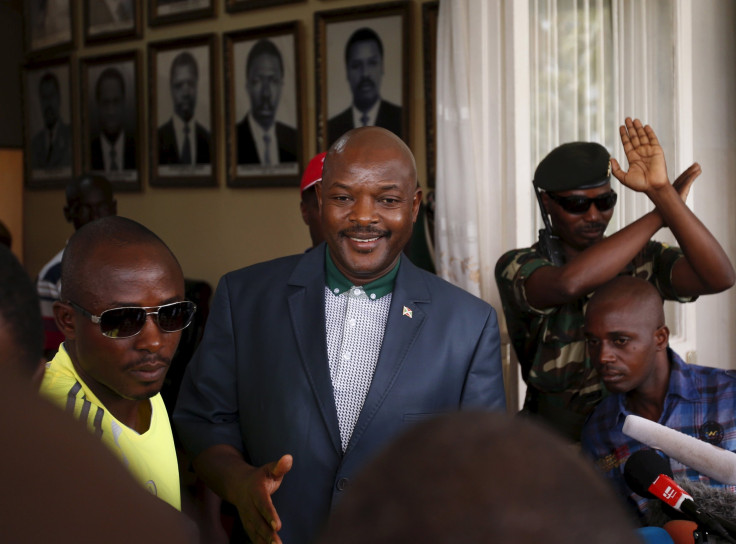Burundi Unrest: US Helps To Evacuate Foreigners, President Pierre Nkurunziza Warns Of Islamist Threat

The United States helped evacuate American, Canadian and other nationals from Burundi, which has been engulfed by political unrest amid street protests and a failed coup attempt. Meanwhile, Burundian President Pierre Nkurunziza made his first public appearance on Sunday since last week's coup -- after days of disappearance from the capital Bujumbura -- and announced that the country was facing an Islamist threat.
The U.S. had cited the “volatile” situation in the east African country and announced a travel warning earlier. Jeff Rathke, the State Department’s spokesman, said that the U.S. had helped nearly 20 American citizens get on a commercial plane to a safer region. On Sunday, the U.S. helped four Canadian citizens and people from other nationalities to safer lands on three charter flights, Agence France-Presse (AFP) reported.
"The security situation remains fluid and volatile because of militia, military and security forces activity in Bujumbura," Rathke said, according to Deutsche Welle, adding: "There may be increased political tensions and civil disturbances related to these actions."
Rathke said, according to AFP, that the U.S. had received several diplomatic requests for assistance after weeks of protests left at least 20 people dead.
Protests against Nkurunziza -- who took office in 2005 as Burundi emerged from 12 years of civil war -- began in April after his bid to serve a third term, in defiance of the constitution's two-term limit. Burundi is scheduled to hold its general elections beginning next month.
On Wednesday, a group of senior army generals in the country tried to overthrow him. However, the coup was not successful.
On Sunday, Nkurunziza said he was “very preoccupied” by the threat posed by al Qaeda-linked militant group, al Shabaab, over the past few days.
"We take seriously the threat of al Shabaab," Nkurunziza said, according to Reuters. But a spokesman for the Islamist group said that the leader’s claims were “dumbfounding” because the problems were of “domestic” nature.
"We think that this is an attempt by him to appease his people, who are standing in the streets protesting against his dictatorship, or to divert the world's attention from him while he possibly prepares his mass revenge," Sheikh Ali Mahamud Rage told Reuters.
Meanwhile, the protests against Nkurunziza, which had been paused for the past few days will resume on Monday, Vital Nshimirimana, a leader of a group of Burundian civil society groups, said, according to Reuters.
Thousands of people have fled to neighboring countries to escape political violence in Burundi, the U.N. refugee agency UNHCR said on Friday. "Over 105,000 people have now fled the country, with 70,187 in neighboring Tanzania, 26,300 in Rwanda and 9,183 to the province of South Kivu in the Democratic Republic of the Congo," it said.
© Copyright IBTimes 2025. All rights reserved.






















